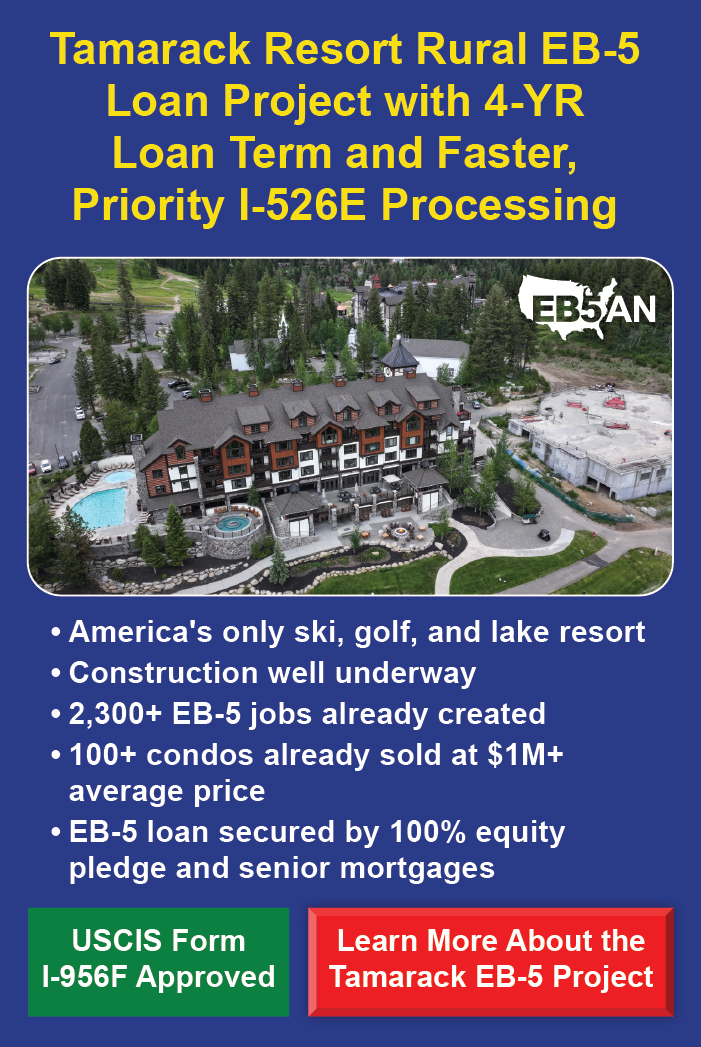Due Diligence in EB-5 Investments
Within the EB-5 program, conducting due diligence with a thorough investigation of the EB-5 project and major players and the regional center that will be handling the investment will help the investor ensure the safety of his or her investment and be informed on the risks associated with the program and the likelihood of being approved for permanent resident status. The following section describes the various issues that EB-5 investors should be considering when conducting due diligence investigating potential investments.
Areas of Concern
EB-5 investors put up a substantial amount of money for the opportunity to apply for permanent resident status. Investors would like to know what to expect from this process and whether the investment is worth it. Primarily, they are concerned with the end results: Will their investments give them permanent resident status? Will their investments be returned to them upon the completion oftheir respective projects?
In order to complete the EB-5 process, investors have to provide documentation with their petition filing that proves that they have met the conditions outlined by USCIS. In the initial I-526 petition, the investor is required to document that the investment funds have been legally obtained and that the chosen investment project as outlined will be able to create the needed 10 full-time jobs for U.S. workers. The final petition, Form I-829, requires the investor to provide evidence that the required jobs have been created and that the investment has remained at risk. The entire EB-5 process can take up to six years when processing delays are taken into consideration; it may take even longer for Chinese foreign nationals.
The $1,000,000 (or $500,000 if the project is in a targeted employment area) required for the investment is a substantial amount of money; thus, investors are very interested in ensuring that they receive a return on their investment capital. It is important to conduct due diligence into the project details to verify that it will be capable of paying back the amount of capital invested at the conclusion of the project. Immigration quickly becomes very expensive without the expectation of a return on the investment.
Points to Consider
When conducting due diligence, EB-5 investors should evaluate several characteristics of the prospective regional center before committing to the investment.
1. The regional center’s history with visa petitions
A potential investor should obtain statistics on the regional center’s success with past petitions andquery the regional center regarding any denied petitions. While occasionally a denial is due to illegal funds or a similar issue, a thorough history will give the investor an idea ofhow likely petition approval willbe through a particular regional center.
2. How long it has been since the regional center was approved by USCIS
Potential investors should first look at how long the regional center has been functioning and the number and type of projects it has successfully managed. A brand-new regional center is going to have substantially less experience with potential issues that may arise during the EB-5 investment process. In addition, a regional center that has successfully handled similar projects in the past will know what USCIS looks for in the petitions and accompanying documentation. Over the past few years, USCIS has been conducting reviews of designated regional centers that have not successfully managed projects according to EB-5 regulations, and a history of successful project management will improve the odds that the regional center will be able to manage the project through to its completion without losing its approval.
3.Project approval
USCIS is required to carefully review the business outline and economic impact estimate for each EB-5 project. This process can take some time, causing delays in petition approval. Investors can bypass some of this delay by selecting a project that has already been approved by USCIS. In addition, investors should make sure that the project manager has already obtained any permits that will be needed for the project before selecting the project for investment.
4.Potential for job creation
If the investment capital does not result in the creation of 10 new full-time jobs, the final EB-5 petition will not be approved, and the investors will not receive permanent resident status. Thus, it is important to make sure that the project has planned for any situations that may reduce the number of jobs created. The project developers should create a business plan that will result in the creation of more jobs than are needed to provide a cushion and ensure adequate job creation. This is particularly important if there are multiple investors for a single project.
5.The existence of a redeployment plan for investment capital
EB-5 investment capital is required to remain at risk for the duration of the program, i.e., until the final I-829 petition has been approved. If the investment loan is repaid early, this requirement will not be met. Regional centers need to be aware of this and have a contingency plan. They can either include in the contract that early repayment is not permitted or plan to reinvest any funds that are repaid early into another existing project to keep them at risk. It is recommended to consult with a financial advisor regarding the best plan of action.
The Value of An Experienced EB-5 Professional
The EB-5 process can be lengthy and somewhat complicated, as well as being risky in regard to both immigration and finances. Collaborating with experienced EB-5 professionals can substantially improve the chances of successful immigration and investment return. Immigration attorneys can assist their EB-5 clients in preparing petitions and accompanying documentation and advise as needed throughout the process. Financial consultants can assist EB-5 investors in negotiating loan contracts and protect them from fraudulent practices of other involved parties.
Due diligence allows EB-5 immigrant investors to make informed decisions that will be in their best interest and increase the likelihood of successful immigration and investment return. The amount of money invested in the project alone justifies any time and effort required in conducting due diligence, as does the need or desire for timely immigration. Due diligence will maximize the chances of success for all parties involved.







